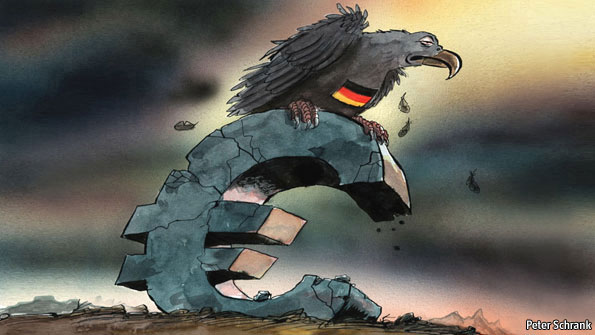
From Charlemagne, the Economist: Once again, Europe has a German problem. In its handling of the euro crisis, Germany’s government stands accused of weakness, indecision and populism. Pro-European Germans say that Chancellor Angela Merkel believes that theirs has become just another normal European country. They add ominously that this risks flirting with Euroscepticism, even nationalism. …
By happy accident, the German government recently played host to a gaggle of Brussels-based reporters. To judge from their comments, the charge that German leaders have turned nationalist seems overblown. Nor have Germany’s rulers become Eurosceptic, exactly. But they are clearly fed up. And a fed-up Germany is not a minor political development in Europe.
The other message they wanted to broadcast is that rash steps—such as explicitly turning monetary union into a transfer union in which the thrifty pay for the profligate—could easily make German voters worryingly Eurosceptic. Senior figures point to weak support for the European project in lots of countries and No votes in various referendums. They note strong support for extreme nationalists in France, the Netherlands and Austria. Imagine if such parties emerged in Germany, they murmur.
Even if they are not nationalists in the flag-waving sense, German politicians now seem comfortable asserting Germany’s national interests as the largest EU member and biggest net contributor to its budget. Until reunification, Germany was economically strong but politically weak, says Thomas de Maizière, the interior minister and a close ally of Mrs Merkel’s. This was “convenient” for other European countries, who grew used to Germany writing cheques. Today’s Germany is ready to represent its interests with “new vigour”, just as France and Britain have for many years. Those interests include strict adherence to German law, the constitution and the EU treaties. If this slows decision-making, so be it. Germany resents being told to hurry up because the law does not matter or is trumped by politics. (graphic: Economist)
Image: economist%205%2028%2010%20Germany%20euro%20crisis.jpg
